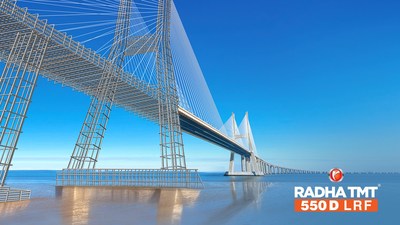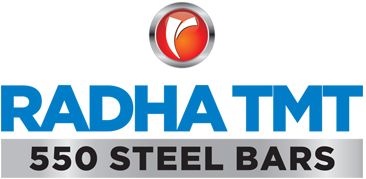HYDERABAD, India, Dec. 6, 2021 /PRNewswire/ — Large Infrastructure Projects and modern High-rise buildings are built with reinforced concrete frameworks which require Steel of higher tensile strength and ductility.

Such Steel Rebars which are embedded in these concrete frameworks not only help the structures to support their weight but also resist earthquakes.
Radha TMT ® 550D LRF Steel Rebars undoubtedly, the very first in South India, are made using advanced LRF Technology which ensures higher ductility and greater strength.
These Steel Rebars not only have good bonding properties to concrete but also highly durable. Here are a few reasons why it makes a perfect sense to choose Radha TMT® 550D LRF Rebars:
- Only high-quality raw materials used
- Fully automated high-speed mill
- Superior LRF Technology
- German Quenching and Self-tempering technology -THERMEX®
- Stringent testing and quality control system
With such technology and processes in place, one can rest assured that every single TMT Rebar from Radha Smelters’ plant bears the distinct Radha stamp of quality and reliability.
Radha TMT® 550D LRF is all set to create new benchmark and achieve the status of being the preferred brand of every leading Builders, Architects and Structural Engineers across the country.
In Radha TMT® 550D LRF, “550” stands for minimum yield stress. The letter “D” denotes Ductility which means that the Steel Rebars have a higher percentage of elongation that offer greater resistance to natural calamities and other stress factors.
Radha Smelters use the clean Iron ore as primary raw material and deploys world class LRF and Thermex as the process technologies to produce the highest quality of 550D grade of TMT Rebars in 8mm to 32 mm sizes.
Ladle Refining Furnace (LRF) Technology LRF or Ladle Refining Furnace technology is used to improve the quality of liquid steel through refining, purifying and fine-tuning of its chemistry.
This process requires additional heat. Therefore, the ladle is provided with electrodes which heat the liquid metal and minimize thermal losses.
Inside Ladle Refining Furnace In LRF, the liquid metal is refined and purified by lowering the Sulphur, Phosphorous and dissolved Gases levels and homogenized in terms of temperature and chemical composition as per stringent BIS norms to provide the ideal strength and flexibility to the TMT Rebars.
Inclusions are also removed to ensure that steel is of the highest quality and exhibits superior mechanical properties
Key Features:
- Higher Ductility
- Lower Carbon Levels
- Better Weldability
- Higher Fire Resistance
- Up-to 18% Elongation
Radha 550D LRF TMT Rebars are ideal choice for:
- Infrastructure in Seismic Zones
- Dams & Wind Turbine Foundation
- Industrial & Underground Structures
- Ports & Airports
- Bridges & Flyovers
- High Rise Buildings
- Concrete Roads
- Independent Bungalows
For details contact:
Radha Smelters Private Limited
Corporate Office: 8-2-269/S, Plot no 75 & 76
Sagar Co-operative Society
Banjara Hills, Road no 2, Hyderabad -500 034
www.radhatmt.com
About Radha TMT
Radha Smelters has worked shoulder to shoulder with industry leaders in India’s progress and grown in every passing year since inception, unwaveringly nurturing a culture of Excellence. Today, as the country is on its way to becoming a superpower, the company has emerged as a player to reckon with in its sector. It has forged its name as a leading brand in TMT bars in India that is synonymous with superior Quality. Headquartered in Hyderabad, a city known for its infrastructure, RadhaTMT is a preferred brand for its innovative spirit and adherence to quality. Its progressive outlook and strong values based on lasting relationships make it a company of the future, and for the future.
Photo: https://mma.prnewswire.com/media/1703005/Radha_TMT.jpg
(Disclaimer: The above press release comes to you under an arrangement with PRNewswire India and this publication takes no editorial responsibility for the same.)

